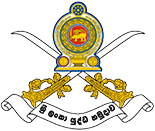Giving an elaborate perspective of National Security concerns and challenges ahead, the War Hero, Major General Udaya Perera, Commander, Security Force Headquarters - Kilinochchi (SFHQ-KLN) during the day’s (Wednesday 4th) Session One of the ongoing ‘Defence Seminar - 2013’ identified regional, global and national threats as far as Sri Lanka’s security is concerned.
Here follows the full text of his comprehensive presentation;
“Sri Lanka is the only county in the contemporary world which was able to comprehensively defeat a hybrid Terrorist movement once recognized as the most deadliest and ruthless which bleed the nation for almost three decades involving in a protracted separatist campaign. Today Sri Lanka is enjoying the full benefit of violence free environment, steadily moving towards permanent peace and stability despite countless attempts by many actors to destabilize it once again. The success was mainly due to enduring national will to defeat separatism orchestrated by charismatic political leadership. Countless sacrifices of tangible and intangible resources, wining over feelings of mistrust, inculcating tolerance over hate and forgiveness led to harness the national will in support of the common goal of defeating terrorism. The strength of our resilient nation is the ability to forgive and forget traumatized past with the hope of looking towards a better future in a harmonious society. Nevertheless anti social and anti Sri Lankan elements are at a countless struggle to tarnish the hard won victory over terrorism by haunting the past undermining the sovereignty and territorial integrity of our nation. Therefore it could be stated that Sri Lanka still encounters an active potential threat from varied sources. Protecting the state and the nation against these threats is the foremost responsibility of the Government and its defense forces. A comprehensive National Security Strategy to pursue the nation’s interest without any impediment is the foundation of a progressing country in attaining prosperity and sustainable peace. It is the enduring right of any sovereign state to formulate its National Security Strategy to safeguard its national interest by considering strategic threat environment. **As Lord Palmerston said “Nations have no permanent friends or allies, they only have permanent interests” is more relevant in today’s context. This implies every sovereign nation whether big or small, strong or weak, developed or undeveloped has the right to peruse its national interests for the best advantage of the nation without being a threat to another, and every other nation shall respect the “fair and just” national interests that every sovereign has the right to peruse. However, conflicts of interests are very common in this Volatile, Uncertain, Complex and Ambiguous international environment that may lead to dissatisfaction and disputes amongst nation states. Therefore, Diplomacy, diplomacy and diplomacy is foremost national power in dealing with potential triggers, through bilateral and multilateral diplomatic engagement to avoid conflict and military should be in full readiness to mitigate and face unavoidable and unforeseen threats and challenges.
With that as the background I will now proceed to very briefly identify common global threats and challenges and then discuss new trends, challenges and concerns on national security of Sri Lankan in post conflict context.
Common Global Threats and Challenges:
The common global security threats could be analyzed under broad categories as depicted on the screen:
a. Nuclear.
b. Biological.
c. Cyber.
d. Environment and Climatic Changes and Natural Disasters.
e. Transnational Crime.
f. Terrorism.
Nuclear
After the Cold war and with the disintegration of erstwhile USSR, the traditional nuclear competition and the threat of nuclear race have reduced drastically. **However, large stockpiles of nuclear arsenals remain with nuclear nations including in our neighborhood raising security concerns. Further, as nuclear disarmament is a dream and nonproliferation is unrealistic the conventional nuclear threat will continue to remain. However, a more likely contemporary threat would be a low-yield “dirty bomb” in the hands of terrorists.
In Sri Lankan context proximity of nuclear facilities of peaceful purposes may pose a threat due to the possibility of a leak as in the case of Fukushima nuclear plant in the year 2011. Threats of this nature cannot be ignored or ruled out especially due to scale and frequency of natural disasters owing to climatic change.
Biological Threats
Countering Biological Threats with an underlying theme that biological weapons eventually will be used in a terrorist attack is a possibility that should be catered in national security strategy where Sri Lanka land forces should be capable to deal with.
Cyber
The drumbeats of cyberwarfare have been sounding for years. Network intrusions are widely viewed as one of the most serious potential challenges to national security, public safety and to economic domain. Technology, in this case, becomes a double-edge sword. It is becoming more and more clear that the increasing persistence and sophistication of cyber attacks will require solutions beyond the traditional.
Emergence of technology driven new media including social media sites such as Facebook, Twitter and other websites on the Internet, operating in the cyber domain has also become a threat to national security. We have seen the potential of this new media to destabilize nations and affect serious change in the case of countries like Tunisia, Libya, and Egypt. Although the likelihood of events such as the Arab spring transpiring in Sri Lanka is extremely remote, it being a matured democracy with an extremely popular political leadership, this is yet another threat that needs to be monitored. As per research conducted by IT and social science professionals, the category called the NEETs, personnel Not in Education, Employment or Training, a segment of youth who idle are the largest community of youngsters globally and locally that engages in activities in the web on which intelligence community need to keep a close watch.
Transnational Organized Crimes
Law-enforcement agencies world over, see transnational criminal networks as national security challenges. These groups cause instability and subvert government institutions through antisocial activity in collaboration with local underworld. Transnational criminal organizations have accumulated unprecedented wealth and power through the drug trade, arms smuggling, human trafficking, and other illicit activities that exceed 50 in number. They extend their reach by forming alliances with terrorist groups. Even advanced sophisticated technology in developed countries is not nearly enough to counter this threat. The way forward is through intelligence sharing and cooperation between law enforcement authorities and defence establishments.
Terrorism
According to Bruce Hoffman, all terrorists share one common denominator; they “live” in the future, and are convinced that they will defeat their enemies”. Sri Lanka gave a strong message to terrorists that live in the future and proved they are not indispensable. Sri Lanka proved beyond doubt that terrorism can be defeated with a well articulated whole of government strategy and a well focused charismatic political leadership.
As per David C Rapport, the world has experienced for waves of modern terrorism starting from late 19 th century. They are Anarchist, Anti-colonial, New Left and the last and most ferocious the Religious/Ethnic wave. Sri Lanka bravely faced last three waves while comprehensively defeating the New Left Wave and the Ethnic Wave. While third wave was more of insurgency and the fourth was Hybrid Terrorism practically and by definition. Dr Tom Marks explains the difference being “ in insurgency Terrorism is a Tactic and Terrorism is a logic in classic Terrorism. In hybrid terrorism, terrorist groups go beyond Tactics and Logic and employ conventional and other means of warfare to achieve political ends.
LTTE at the time of confronted by the state in the year 2006 had established a counter state in North and East of Sri Lanka controlling a land mass of 1300 Sq Km. They also boasted of maintaining an so-called Army, Navy, Air Force and other institutions that are required for a state entity. This hybrid Terrorist outfit was comprehensively defeated, firstly, by isolating it globally, regionally and locally through the elements of national power and "isolated LTTE" received the final death blow from the Military, as depicted on the screen. Taking David's Wave theory together with Huntingtons theory of clash of civilizations as the global conflict in the offing, NSS should ought to focus on a possible fifth wave which may be a Tsunami than a wave if not prevented.
There are elements that are propagating the fifth wave internationally which will be discussed subsequently. In the present context international community should be mindful of hybrid terrorism being spread through networks of attachments and prevent the fourth wave being transformed to the fifth.
Challenges and Security Threats due to Environmental and Climate Change and Natural Disasters:
The national security ramifications of climate change are severe. Although the topic of climate change has been hugely politicized, issue should be considered as a serious security crisis. In the 21st century, we recognize that climate change can impact national security - ranging from rising sea levels, to severe droughts, to the melting of the polar caps, to more frequent and devastating natural disasters that raise demand for humanitarian assistance and disaster relief. Change created by a warming planet will lead to new conflicts over refugees and resources. Catastrophic natural disasters can also lead to severe leaks of radioactive material and poisonous gases, all these would require increased military support which is considered in our strategy.
New Trends, Challenges and Concerns on National Security of Sri Lanka in Post Conflict Context:
Threats specific to Sri Lanka’s National Security are mainly of unconventional nature imposed by non state actors and proxies. This situation could be further evaluated under following broad categories as depicted on the screen:
a. Ideological Threat and International Network.
b. Threats from Non State Actors
c. Destabilization through constituting ethnic and religious enclaves.
d. Perception
Ideological Threat and the International Network:
Most severe threat to NS derives from separatist ideology through the facilitation of pro LTTE international network. Though LTTE was completely defeated locally the international network is becoming more and more active due to support they enjoy from regional extremist political entities that share similar ethnic sentiments and the Tamil diaspora. Some international state and non state actors too are supporting through persuasion and for local political gains. Many major cities in the world and some capitals are with ethnic enclaves that can influence constituencies to a great extent through lobbying and political manoeuvring. Local politicians in these constituencies may not be able ignore the influence of these naturalized tamil elements in their political campaigns and in power politics. While Organisations that were active during the period of conflict in supporting the LTTE politically, financially and morally continues to propagate the ideology some more organisations with leading LTTE members who left the country during last stages of military humanitarian operation have mushroomed in the international scene to continue the ideological campaign. Organisations such as TGTE, BTF, MTF, HQ GP and TCC work as a closely knitted network with GTF under Fr Emmanuel as the hub. These organisations are capitalising on the vulnerability of Tamil economic refugees for their advantage. While some governments are supporting these elements based on false propaganda some states turn a blind eye giving excuses such as their domestic laws do not permit any action against such organizations.
This attitude of nations will never deter global terrorism, rather will blossom. James J Carfarno clearly identifies such states in his book "how to win the long war" as Aggressors, Enablers and Slackers. Therefore threat to National Security is not only from organisations that carry the ideology but also from aggressor, enabler and slacker nations.
Global Tamil Forum (GTF), the centric network of organizations has successfully influenced a number of politicians from various political parties in European countries as well as the United States, Australia, Canada, and India to support the separatist Ideology. In addition, the GTF has courted officials within international organisations such as the United Nations, the European Union and various international non-governmental organizations to obtain their support. Therefore Sri Lanka needs the support of the international community to deal with organizations that seek not only to challenge the sovereignty and integrity of our nation but also to breed terrorism with separatist ideology.
Destabilizing the Nation by Creation of Ethnic and Religious Enclaves:
Internationally active groups with a separatist ideology such as GTF, BTF, TCC, HQ Gp and TGTE is vying for a separate state through a well orchestrated strategy, initial step being creating and strengthening of Ethnic enclaves. LTTE terrorists did this through ethnic cleansing and GTF and TGTE is doing it by exerting international pressure to the Sri Lankan Government for constitutional changes by lobbying foreign governments. Some governments are exerting pressure on the Govt of Sri Lanka to legalize the process without anticipating the threat posed by such moves to national and regional security.
Threats from Non State Actors
Non state actors and entities are of basically two categories. They are violent and non violent. Violent non state actors include terrorist, insurgent and violent extremists groups that were discussed earlier under the heading terrorism. Threat from non violent non state actors comes from INGOs, and NGOs who work on a hidden agenda to destabilize the sovereign state of Sri Lanka. I need to go back to the history, to the 17th century. Treaty of Westphalia was signed in 1648 to bring in amity and promote the state as the most prominent and most influential actor in world politics. For the first time in the history of the world,
Westphalia Treaty recognized the principle of the sovereignty of nation states, secondly the principle of equality between nation states, thirdly the principle of internationally binding treaties between states and fourthly the principle of non intervention of one state in the internal affairs of the other. In short the Peace of Westphalia believed that there is nothing more important than the sovereignty of a state. However 21st century has taken a different turn where day by day state sovereignty is diluting giving way to non state entities with their wealth and influence to dictate terms to states. This dangerous trend if not checkmated will lead to creation of weak states and ungoverned spaces where violent non state actors could be active creating an unsafe world.
Perception
Sri Lanka post-war environment is marked by the Government’s strong focus on economic development, including reconstruction of the war-affected areas. Against this backdrop, the Government lifted the emergency regulations in September 2011 while reiterating a threat to Sri Lankan sovereignty posed by the activity of the TGTE, BTF, GTF, and other transnational separatist organizations that are regularly having links and deals with foreign parliamentarians and heads of international organizations. These groups form the core for separatism. They are responsible for strong lobbying on issues of accountability and human rights violations by distorting facts. This includes manipulating information, communicating false information, propagating deceptive information and communications designed to distort the perception of the international community and the local Tamil population regarding government policies, ranging from international issues to domestic politics. The TNA Political campaign for the Northern Provincial Council Elections to be held in September this year is based on these lines and is funded by these organizations and part of the Diaspora that wage a perception campaign against the Government of SL. Therefore perception management through a diplomatic and information campaign essentially form part of the National Security strategy and Army too has a role to play.
Conclusion
The above Security Concerns related to Sri Lankan National Security encompasses a number of challenges the state need to address in the post conflict scenario to ensure sustainable peace. The government's grand strategy in the post conflict scenario is based on 5Rs in achieving sustainable peace and development for which the Sri Lankan Army plays a major role.
In a post conflict scenario state intelligence services have a major role to play in identifying new threats in order to revisit and shape and reshape to meet the challenges of complex and ever-changing security environment. The Sri Lanka Army, together with its Intelligence arm as the largest military component is fully engaged in achieving sustainable peace and also fully prepared to meet challenges to national security in the post-conflict environment by closely monitoring new trends.”
Here follows the full text of his comprehensive presentation;
“Sri Lanka is the only county in the contemporary world which was able to comprehensively defeat a hybrid Terrorist movement once recognized as the most deadliest and ruthless which bleed the nation for almost three decades involving in a protracted separatist campaign. Today Sri Lanka is enjoying the full benefit of violence free environment, steadily moving towards permanent peace and stability despite countless attempts by many actors to destabilize it once again. The success was mainly due to enduring national will to defeat separatism orchestrated by charismatic political leadership. Countless sacrifices of tangible and intangible resources, wining over feelings of mistrust, inculcating tolerance over hate and forgiveness led to harness the national will in support of the common goal of defeating terrorism. The strength of our resilient nation is the ability to forgive and forget traumatized past with the hope of looking towards a better future in a harmonious society. Nevertheless anti social and anti Sri Lankan elements are at a countless struggle to tarnish the hard won victory over terrorism by haunting the past undermining the sovereignty and territorial integrity of our nation. Therefore it could be stated that Sri Lanka still encounters an active potential threat from varied sources. Protecting the state and the nation against these threats is the foremost responsibility of the Government and its defense forces. A comprehensive National Security Strategy to pursue the nation’s interest without any impediment is the foundation of a progressing country in attaining prosperity and sustainable peace. It is the enduring right of any sovereign state to formulate its National Security Strategy to safeguard its national interest by considering strategic threat environment. **As Lord Palmerston said “Nations have no permanent friends or allies, they only have permanent interests” is more relevant in today’s context. This implies every sovereign nation whether big or small, strong or weak, developed or undeveloped has the right to peruse its national interests for the best advantage of the nation without being a threat to another, and every other nation shall respect the “fair and just” national interests that every sovereign has the right to peruse. However, conflicts of interests are very common in this Volatile, Uncertain, Complex and Ambiguous international environment that may lead to dissatisfaction and disputes amongst nation states. Therefore, Diplomacy, diplomacy and diplomacy is foremost national power in dealing with potential triggers, through bilateral and multilateral diplomatic engagement to avoid conflict and military should be in full readiness to mitigate and face unavoidable and unforeseen threats and challenges.
With that as the background I will now proceed to very briefly identify common global threats and challenges and then discuss new trends, challenges and concerns on national security of Sri Lankan in post conflict context.
Common Global Threats and Challenges:
The common global security threats could be analyzed under broad categories as depicted on the screen:
a. Nuclear.
b. Biological.
c. Cyber.
d. Environment and Climatic Changes and Natural Disasters.
e. Transnational Crime.
f. Terrorism.
Nuclear
After the Cold war and with the disintegration of erstwhile USSR, the traditional nuclear competition and the threat of nuclear race have reduced drastically. **However, large stockpiles of nuclear arsenals remain with nuclear nations including in our neighborhood raising security concerns. Further, as nuclear disarmament is a dream and nonproliferation is unrealistic the conventional nuclear threat will continue to remain. However, a more likely contemporary threat would be a low-yield “dirty bomb” in the hands of terrorists.
In Sri Lankan context proximity of nuclear facilities of peaceful purposes may pose a threat due to the possibility of a leak as in the case of Fukushima nuclear plant in the year 2011. Threats of this nature cannot be ignored or ruled out especially due to scale and frequency of natural disasters owing to climatic change.
Biological Threats
Countering Biological Threats with an underlying theme that biological weapons eventually will be used in a terrorist attack is a possibility that should be catered in national security strategy where Sri Lanka land forces should be capable to deal with.
Cyber
The drumbeats of cyberwarfare have been sounding for years. Network intrusions are widely viewed as one of the most serious potential challenges to national security, public safety and to economic domain. Technology, in this case, becomes a double-edge sword. It is becoming more and more clear that the increasing persistence and sophistication of cyber attacks will require solutions beyond the traditional.
Emergence of technology driven new media including social media sites such as Facebook, Twitter and other websites on the Internet, operating in the cyber domain has also become a threat to national security. We have seen the potential of this new media to destabilize nations and affect serious change in the case of countries like Tunisia, Libya, and Egypt. Although the likelihood of events such as the Arab spring transpiring in Sri Lanka is extremely remote, it being a matured democracy with an extremely popular political leadership, this is yet another threat that needs to be monitored. As per research conducted by IT and social science professionals, the category called the NEETs, personnel Not in Education, Employment or Training, a segment of youth who idle are the largest community of youngsters globally and locally that engages in activities in the web on which intelligence community need to keep a close watch.
Transnational Organized Crimes
Law-enforcement agencies world over, see transnational criminal networks as national security challenges. These groups cause instability and subvert government institutions through antisocial activity in collaboration with local underworld. Transnational criminal organizations have accumulated unprecedented wealth and power through the drug trade, arms smuggling, human trafficking, and other illicit activities that exceed 50 in number. They extend their reach by forming alliances with terrorist groups. Even advanced sophisticated technology in developed countries is not nearly enough to counter this threat. The way forward is through intelligence sharing and cooperation between law enforcement authorities and defence establishments.
Terrorism
According to Bruce Hoffman, all terrorists share one common denominator; they “live” in the future, and are convinced that they will defeat their enemies”. Sri Lanka gave a strong message to terrorists that live in the future and proved they are not indispensable. Sri Lanka proved beyond doubt that terrorism can be defeated with a well articulated whole of government strategy and a well focused charismatic political leadership.
As per David C Rapport, the world has experienced for waves of modern terrorism starting from late 19 th century. They are Anarchist, Anti-colonial, New Left and the last and most ferocious the Religious/Ethnic wave. Sri Lanka bravely faced last three waves while comprehensively defeating the New Left Wave and the Ethnic Wave. While third wave was more of insurgency and the fourth was Hybrid Terrorism practically and by definition. Dr Tom Marks explains the difference being “ in insurgency Terrorism is a Tactic and Terrorism is a logic in classic Terrorism. In hybrid terrorism, terrorist groups go beyond Tactics and Logic and employ conventional and other means of warfare to achieve political ends.
LTTE at the time of confronted by the state in the year 2006 had established a counter state in North and East of Sri Lanka controlling a land mass of 1300 Sq Km. They also boasted of maintaining an so-called Army, Navy, Air Force and other institutions that are required for a state entity. This hybrid Terrorist outfit was comprehensively defeated, firstly, by isolating it globally, regionally and locally through the elements of national power and "isolated LTTE" received the final death blow from the Military, as depicted on the screen. Taking David's Wave theory together with Huntingtons theory of clash of civilizations as the global conflict in the offing, NSS should ought to focus on a possible fifth wave which may be a Tsunami than a wave if not prevented.
There are elements that are propagating the fifth wave internationally which will be discussed subsequently. In the present context international community should be mindful of hybrid terrorism being spread through networks of attachments and prevent the fourth wave being transformed to the fifth.
Challenges and Security Threats due to Environmental and Climate Change and Natural Disasters:
The national security ramifications of climate change are severe. Although the topic of climate change has been hugely politicized, issue should be considered as a serious security crisis. In the 21st century, we recognize that climate change can impact national security - ranging from rising sea levels, to severe droughts, to the melting of the polar caps, to more frequent and devastating natural disasters that raise demand for humanitarian assistance and disaster relief. Change created by a warming planet will lead to new conflicts over refugees and resources. Catastrophic natural disasters can also lead to severe leaks of radioactive material and poisonous gases, all these would require increased military support which is considered in our strategy.
New Trends, Challenges and Concerns on National Security of Sri Lanka in Post Conflict Context:
Threats specific to Sri Lanka’s National Security are mainly of unconventional nature imposed by non state actors and proxies. This situation could be further evaluated under following broad categories as depicted on the screen:
a. Ideological Threat and International Network.
b. Threats from Non State Actors
c. Destabilization through constituting ethnic and religious enclaves.
d. Perception
Ideological Threat and the International Network:
Most severe threat to NS derives from separatist ideology through the facilitation of pro LTTE international network. Though LTTE was completely defeated locally the international network is becoming more and more active due to support they enjoy from regional extremist political entities that share similar ethnic sentiments and the Tamil diaspora. Some international state and non state actors too are supporting through persuasion and for local political gains. Many major cities in the world and some capitals are with ethnic enclaves that can influence constituencies to a great extent through lobbying and political manoeuvring. Local politicians in these constituencies may not be able ignore the influence of these naturalized tamil elements in their political campaigns and in power politics. While Organisations that were active during the period of conflict in supporting the LTTE politically, financially and morally continues to propagate the ideology some more organisations with leading LTTE members who left the country during last stages of military humanitarian operation have mushroomed in the international scene to continue the ideological campaign. Organisations such as TGTE, BTF, MTF, HQ GP and TCC work as a closely knitted network with GTF under Fr Emmanuel as the hub. These organisations are capitalising on the vulnerability of Tamil economic refugees for their advantage. While some governments are supporting these elements based on false propaganda some states turn a blind eye giving excuses such as their domestic laws do not permit any action against such organizations.
This attitude of nations will never deter global terrorism, rather will blossom. James J Carfarno clearly identifies such states in his book "how to win the long war" as Aggressors, Enablers and Slackers. Therefore threat to National Security is not only from organisations that carry the ideology but also from aggressor, enabler and slacker nations.
Global Tamil Forum (GTF), the centric network of organizations has successfully influenced a number of politicians from various political parties in European countries as well as the United States, Australia, Canada, and India to support the separatist Ideology. In addition, the GTF has courted officials within international organisations such as the United Nations, the European Union and various international non-governmental organizations to obtain their support. Therefore Sri Lanka needs the support of the international community to deal with organizations that seek not only to challenge the sovereignty and integrity of our nation but also to breed terrorism with separatist ideology.
Destabilizing the Nation by Creation of Ethnic and Religious Enclaves:
Internationally active groups with a separatist ideology such as GTF, BTF, TCC, HQ Gp and TGTE is vying for a separate state through a well orchestrated strategy, initial step being creating and strengthening of Ethnic enclaves. LTTE terrorists did this through ethnic cleansing and GTF and TGTE is doing it by exerting international pressure to the Sri Lankan Government for constitutional changes by lobbying foreign governments. Some governments are exerting pressure on the Govt of Sri Lanka to legalize the process without anticipating the threat posed by such moves to national and regional security.
Threats from Non State Actors
Non state actors and entities are of basically two categories. They are violent and non violent. Violent non state actors include terrorist, insurgent and violent extremists groups that were discussed earlier under the heading terrorism. Threat from non violent non state actors comes from INGOs, and NGOs who work on a hidden agenda to destabilize the sovereign state of Sri Lanka. I need to go back to the history, to the 17th century. Treaty of Westphalia was signed in 1648 to bring in amity and promote the state as the most prominent and most influential actor in world politics. For the first time in the history of the world,
Westphalia Treaty recognized the principle of the sovereignty of nation states, secondly the principle of equality between nation states, thirdly the principle of internationally binding treaties between states and fourthly the principle of non intervention of one state in the internal affairs of the other. In short the Peace of Westphalia believed that there is nothing more important than the sovereignty of a state. However 21st century has taken a different turn where day by day state sovereignty is diluting giving way to non state entities with their wealth and influence to dictate terms to states. This dangerous trend if not checkmated will lead to creation of weak states and ungoverned spaces where violent non state actors could be active creating an unsafe world.
Perception
Sri Lanka post-war environment is marked by the Government’s strong focus on economic development, including reconstruction of the war-affected areas. Against this backdrop, the Government lifted the emergency regulations in September 2011 while reiterating a threat to Sri Lankan sovereignty posed by the activity of the TGTE, BTF, GTF, and other transnational separatist organizations that are regularly having links and deals with foreign parliamentarians and heads of international organizations. These groups form the core for separatism. They are responsible for strong lobbying on issues of accountability and human rights violations by distorting facts. This includes manipulating information, communicating false information, propagating deceptive information and communications designed to distort the perception of the international community and the local Tamil population regarding government policies, ranging from international issues to domestic politics. The TNA Political campaign for the Northern Provincial Council Elections to be held in September this year is based on these lines and is funded by these organizations and part of the Diaspora that wage a perception campaign against the Government of SL. Therefore perception management through a diplomatic and information campaign essentially form part of the National Security strategy and Army too has a role to play.
Conclusion
The above Security Concerns related to Sri Lankan National Security encompasses a number of challenges the state need to address in the post conflict scenario to ensure sustainable peace. The government's grand strategy in the post conflict scenario is based on 5Rs in achieving sustainable peace and development for which the Sri Lankan Army plays a major role.
In a post conflict scenario state intelligence services have a major role to play in identifying new threats in order to revisit and shape and reshape to meet the challenges of complex and ever-changing security environment. The Sri Lanka Army, together with its Intelligence arm as the largest military component is fully engaged in achieving sustainable peace and also fully prepared to meet challenges to national security in the post-conflict environment by closely monitoring new trends.”
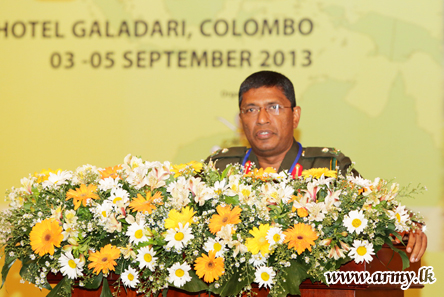 |
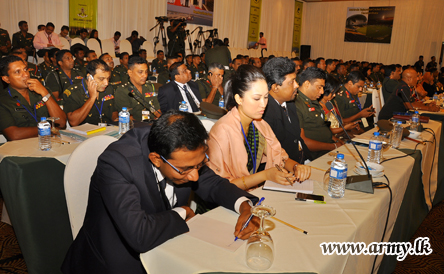 |
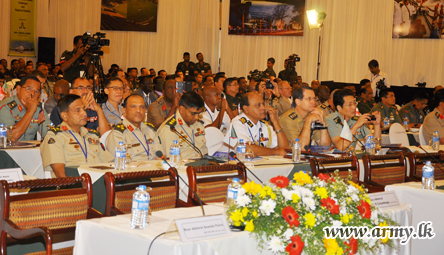 |
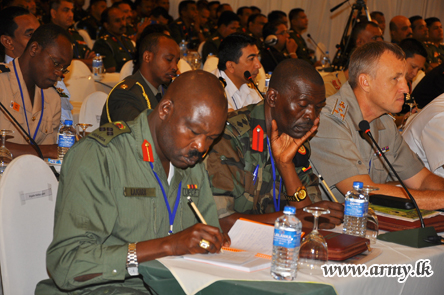 |
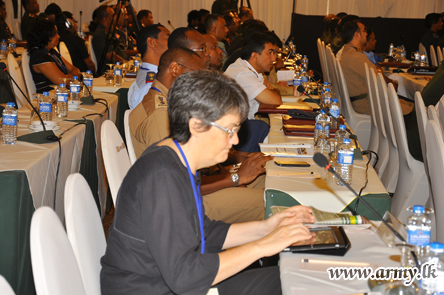 |
